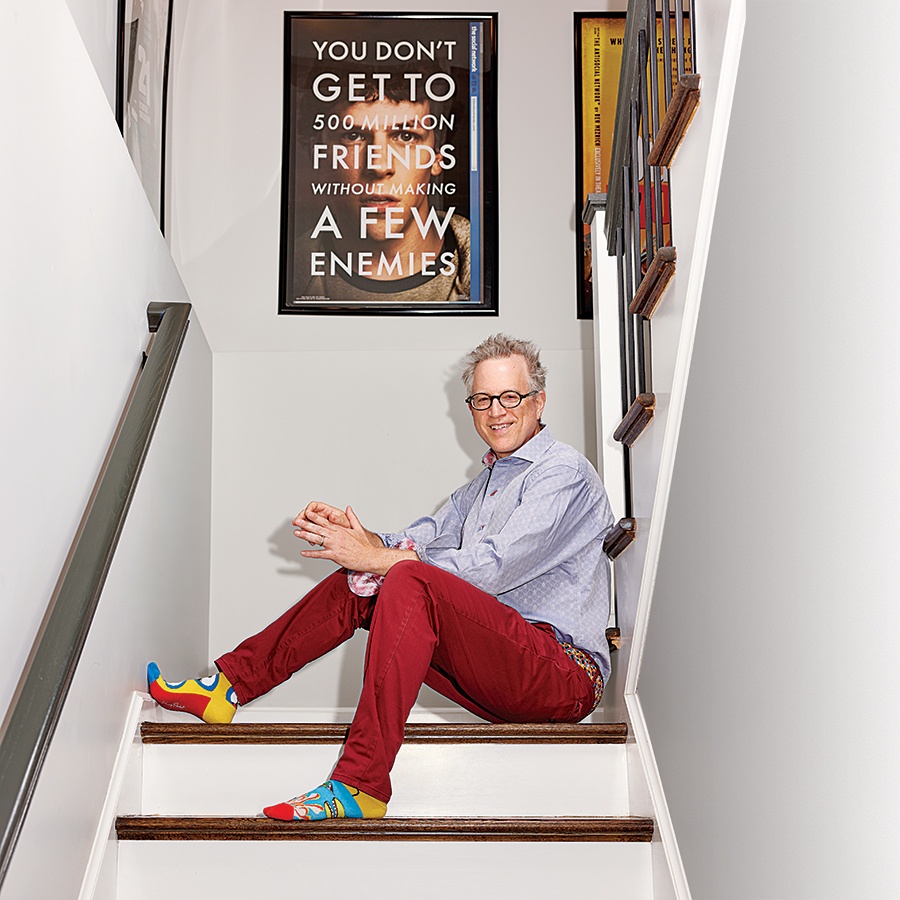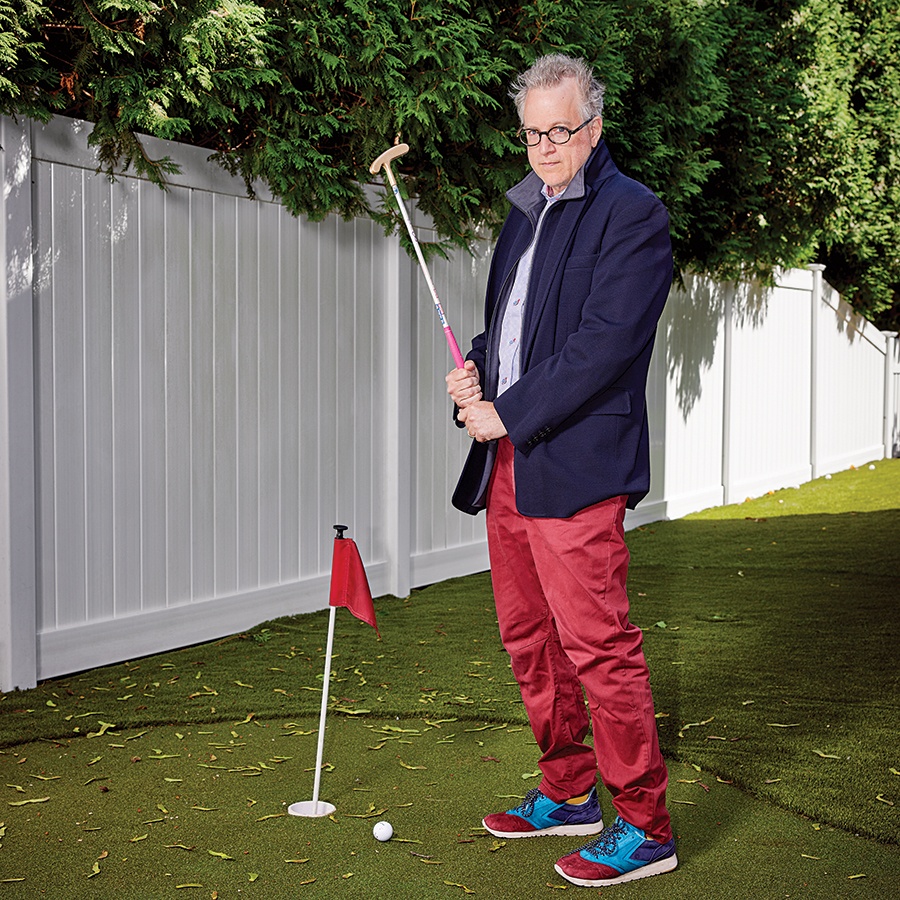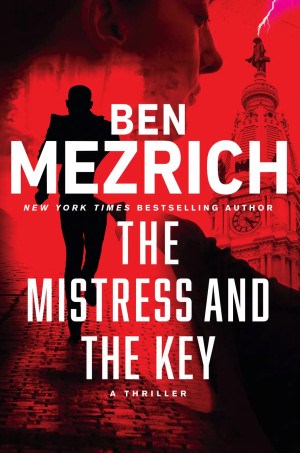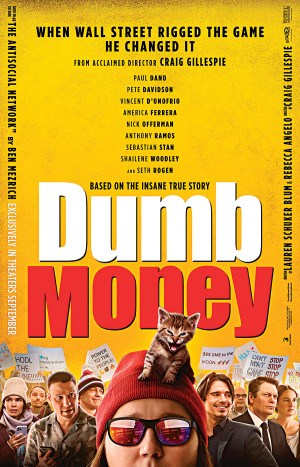Author Ben Mezrich Strikes Hollywood Gold (Again)
With his newest novel The Mistress and the Key on shelves, the wildly prolific local writer talks gambling, the Oscars, and a curious experience with a Russian oligarch.

Ben Mezrich with a poster for the 2010 David Fincher film The Social Network, which was based on Mezrich’s 2009 book The Accidental Billionaires. / Portrait by Ken Richardson / Clothing by Alan Rouleau
From 40 pages a day to six. Kids and life have understandably dialed back bestselling author Ben Mezrich’s daily writing habit, but his literary star is burning stronger than ever. And last year was possibly his brightest yet. The movie Dumb Money, based on his book of the same name, was released; his book Seven Wonders is in development with Amazon; another series is in the works with Netflix; and he’s working on a documentary as well as a book about Abercrombie & Kent founder Geoffrey Kent. Three more movies based on Mezrich’s books are in the works, and The Mistress and the Key—the sequel to The Midnight Ride, which was serialized in the Boston Globe—comes out this month. Still, in between keystrokes and Hollywood handshakes, Mezrich carved out a moment in his whirlwind schedule to chat with us from his country home in Vermont about everything from gambling and Russian oligarchs to always remaining a mall rat at heart.
Yeah. I mean, surprisingly, I’ve suddenly hit a peak in my career. In the past year or so, things have gone phenomenally well. It’s like all the stars came together, and yes, this has been the biggest year of my career, which is kind of nuts. I was in the right place at the right time.What do you attribute it to?
I think people’s consumption habits have become really accelerated. With COVID and everyone being at home more, people watched so much that Hollywood needed stories.
Speaking of COVID, I know you well enough to say you’re not exactly the outdoorsy type, but you’ve spent most of your time since the pandemic in Vermont. Is this a new Ben Mezrich?
Listen, I’m not Cormac McCarthy living under a bridge or whatever he did, or Stephen King sequestered away in Maine. I love shopping malls. I grew up in them, and I miss the Prudential Center every day. I lived above it for more than 25 years. But we ran to Vermont during COVID, and the first six months were, shall we say, challenging. I’d basically go to the end of the driveway with 3 feet of snow, wondering what the hell I was doing here. And then I fell in love with it. I wouldn’t say I’m super-outdoorsy. I’m just as pale as I always was. But I’ve definitely learned to love being out in the middle of nowhere with the family.
But you miss the Prudential?
I do. My wife, Tonya [a Boston contributing editor], basically went into labor in the food court, and when the kids were little, they’d run around that mall like it was their playground.
Which is your favorite of the books you’ve written?
That’s like asking which is your favorite child, although that might be easier to choose. Just kidding. I would say Bringing Down the House. It will always be special to me because it was so much fun to write, and it was my first big success, the first book of mine that anyone really read. I would say Once Upon a Time in Russia is one of my better books in terms of the writing. The story and everything else just kind of came together with that one. I like them all for different reasons.
You didn’t originally set out to write nonfiction, right?
No. I wanted to be Michael Crichton. I wanted to write thrillers. But what I wanted to be as a writer has changed. When I was a kid, I wanted to be Jay McInerney or Bret Easton Ellis, one of those ’80s writers running around New York, drinking in bars and living that rock-star life. But I couldn’t sell any of those books. I got rejection after rejection after rejection, and then an editor said, “Go read John Grisham and Michael Crichton,” and I really fell in love with that. I was obsessed with these techno-thrillers, and then I wanted to do that, and I actually published six books, and nobody read any of them. So I was a thriller writer until I stumbled onto the MIT blackjack story.

Portraits by Ken Richardson / Clothing by Alan Rouleau
Your books now are dramatized retellings of true stories. What’s the biggest liberty that you’re forced to take?
I would say dialogue. Re-creating it based on the information you have, rather than saying, “They talked about this.” I like to put it into their words as best as I can, but it’s tricky, and I’ll be honest, I’m not great at dialogue. It’s not my greatest skill as a writer.
What’s the biggest thing you think you got wrong in one of your books?
There are so many things I get wrong, but I’d say I definitely got the Winklevoss twins wrong in The Accidental Billionaires. They were such caricatures in that book, and the reality was that they were a lot smarter than I wrote them in that story. And I corrected that in Bitcoin Billionaires. But there’s nothing that I’ve written that I look back on and say, “Oh, I wish I didn’t write that.”
Favorite movie adapted from one of your books?
I think The Social Network is one of the greatest movies ever made. When I first saw it, I was completely blown away. There were so many great talents involved, with David Fincher and Aaron Sorkin and the actors they had. It was just incredible.
What would you say is your sweet spot?
I have a couple. I think I’m good at writing about billionaires and rich people either doing bad things or trying to do good things and ending up doing bad. I’m good at writing Shakespearean-type drama between friends and relationships falling apart. I can capture that pretty well, plot-wise. And my descriptions of action. I write cinematically. I write a movie in the form of a book. And I never write a book if I haven’t already sold the movie or TV rights.
Do you ever get emotionally attached to your subjects?
I fall in love with all of my characters 100 percent, every time. I don’t know that an author really needs to be objective. I think it’s more important to tell the story from the point of view of the characters, and so I move from character to character. There’ll be a scene from the point of view of Zuckerberg, then a scene from the point of view of Eduardo Saverin, and a scene from the point of view of the Winklevii. And no character thinks of themselves as the bad guy, right? People, for the most part, like themselves, so when I’m writing from their point of view, I want to like them and understand them. I’m emotionally attached to all of them.
You write about powerful people doing some reprehensible things. Have you ever felt threatened or in danger?
Definitely. When I wrote the oligarch story, Once Upon a Time in Russia, there were plenty of incidents. Ask Tonya. We’d be eating in a restaurant, and I’d be like, “Did that person come near my drink? Did that person bump into me?” I was writing about guys who were telling me how Putin came to be, and there was a period when I didn’t go back to Europe. I still haven’t been back to London, which is where these oligarchs were and where the story took place. These guys were using polonium to poison people. And there was a time when I was at a bar interviewing this oligarch, and as I was leaving, this very big Russian guy came up behind me and stuck his hand in my back pocket. He said, “Don’t look.” And when I got back to my hotel, I pulled whatever it was out. It was a memory card, and I was scared to put it in my computer. I had no idea what it was, but I was thinking, “Am I gonna die?” I flew back to Boston, and I found out that it contained all of these depositions involving Putin and murders, and it was stuff that no one was supposed to have seen. I’ve had a lot of moments like that in my career, where I got into situations that were pretty terrifying.
Is there a project that you either considered or got into and then said, “I’m not doing this?”
There’ve been a few. People come to me with ideas. Remember those Thai kids who were stuck in the cave? All of those kids came to me. I had that story, and then I decided I didn’t know if people were still going to be interested in it a year later. There have been a couple where I’ve been close to doing it. I really wanted to do the FTX story. I knew SBF [convicted felon Sam Bankman-Fried] a little bit. I had his phone number, and I had all of these inside sources. I called my agent and said, “I think I want to do this. It seems perfect for me.” My agent was quiet on the other end of the line, and I was like, “Oh, don’t tell me.” Because my agent also reps Michael Lewis and Walter Isaacson. I said, “Tell me one of those guys is doing it,” and he said, “Michael Lewis has been on it for the past six months.”
Are you a gambler? Do you play blackjack or poker?
I definitely am a gambler. I love it. I stopped playing blackjack. I’m not as good as the MIT players, but Foxwoods didn’t let me come once because I had been hanging out with those guys so much. Counting cards is actually not that hard, but you need to be able to do it smoothly. I can count cards, but not like that. And I play poker. There was a group I played with, gosh, for 15 years.
I feel like I can read people pretty well. I think I understand people very, very quickly after first meeting them. I’m always telling Tonya which couples I think aren’t going to work out and which ones are, and I’m almost always right. I can write these creative stories about people as soon as I meet them. That’s a skill. Also, I don’t have a great memory, but it’s very visual. I have the ability to describe a scene, even if I don’t always get all the details right. I see things very vividly in my head.When did you know you were a success?
There were different moments in my life when I might have said, “Okay, I’ve made it,” but it’s never been like, “Okay, now I’m done.” But probably going to the Oscars with The Social Network was kind of a moment where I felt like, “Wow! This is pretty much up there.”
Is going to the Oscars fun or boring?
For me, it was a lot of fun because Aaron Sorkin went up, and the first thing he did was thank me. So that was one of the greatest moments of my life. As for the Oscars themselves, if you’re not waiting for something, it’s probably not that much fun, but if you’re involved, it is. When your film is up for something, it’s pretty exciting, and then the Oscar parties are crazy, especially for someone who’s not in L.A. all the time. I don’t see celebrities that often, and I’m someone who just goes nuts when I see a celebrity.
So how many pairs of shoes does Tonya have?
Really good question. I could not even hazard a guess. Everywhere I look, I see another pair.
What do your kids think of what you do?
It’s funny. Because of the SAG-AFTRA strike, with Dumb Money, I got to do a lot of the publicity stuff. Normally, the author doesn’t do that. But I did the Toronto Film Festival, and my son, Asher, came with me. I got to do the red carpet, with millions of paparazzi, because none of the actors could show up, right? So I turned to Asher, and I go, “Now do you think I’m cool?” And he was like, “Not really.” But they’ve been watching me do book signings since they were born, basically, so I think for them, it just seems very normal.
Is there a number of how many books you want to leave behind when you die?
[Laughs.] Well, my goal has always been to do a book a year, y’know, forever. Writing is not a career that you have to retire from. So I’ll just keep doing it until the end. Hopefully, I get another 20 or 25 books? I think I’m at 27 books at this point, so I would say at least 50, but you never know.
If you weren’t doing this, what would you be doing?
Oh my gosh, I don’t think there was ever a Plan B. Starting when I was 12 years old, this is all I ever wanted to do. I don’t think there’s any other option.
By the Numbers
Mezrich & the Movies
How Boston’s bestselling author conquered Tinseltown.
1998
Year Ben Mezrich published a novel that became the TV movie Fatal Error, his first film to be made from a book.
0
Number of nonfiction books Mezrich has written that haven’t been acquired to be made into movies.
2
Number of his movie adaptations that have opened at number one at the box office. No other nonfiction author can say the same.
3
Number of Oscars that The Social Network—which was based on Mezrich’s book The Accidental Billionaires—won in 2011.
16
Number of days after the initial GameStop stock surge that Mezrich signed a deal with MGM to make a movie—Dumb Money—about it, based on his book proposal.
First published in the print edition of Boston magazine’s October 2024 issue with the headline, “The Write Stuff.”
Previously
- The Interview: Crime-Fiction Writer Dennis Lehane
- The Interview: Novelist Hank Phillippi Ryan
- Bestselling Author Sebastian Junger on PTSD, Mortality, and His Near-Death Experience in Truro




